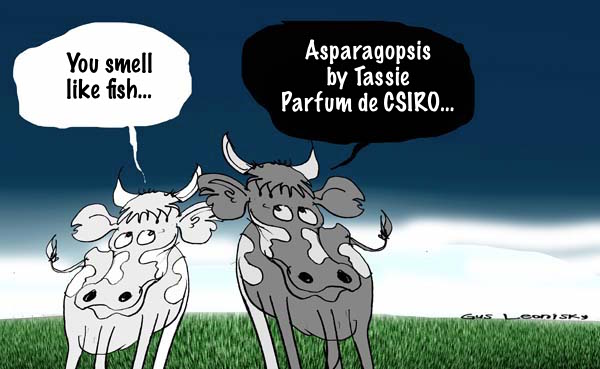Search
Recent comments
- arseholic....
13 min 58 sec ago - cruelty....
1 hour 30 min ago - japan's gas....
2 hours 10 min ago - peacemonger....
3 hours 7 min ago - see also:
12 hours 8 min ago - calculus....
12 hours 22 min ago - UNAC/UHCP...
17 hours 3 min ago - crafty lingo....
18 hours 27 min ago - off food....
18 hours 36 min ago - lies of empire...
19 hours 35 min ago
Democracy Links
Member's Off-site Blogs
methane reductions...

Edible seaweed has long been a staple in Asian cuisines, but now its target market is shifting to the four-legged consumer.
Key points:
- A Tasmanian start-up is farming a special native red seaweed for its methane-reducing properties when fed to livestock
- The state's largest milk company is starting a trial with the product to see if it can be used at scale on working farms
- The partnership hopes to reduce methane produced by livestock, which accounts for 10 per cent of Australia's total greenhouse gas emissions
The CSIRO has previously shown that a small amount of Asparagopsis seaweed added to a cow's diet can reduce methane emissions by more than 80 per cent.
Livestock account for 10 per cent of Australia's total greenhouse gas emissions.
A Tasmanian start-up is hoping to fix this problem by farming the waterborne plant and supplying it to farmers.
Former fashion designer Sam Elsom is the founder of Sea Forest, which is growing the plant at Triabunna on Tasmania's east coast.
"In our hatchery, we get the seaweed to attach to ropes and we're deploying that out in the ocean in a marine lease," he said.
- By Gus Leonisky at 25 Jul 2020 - 5:10pm
- Gus Leonisky's blog
- Login or register to post comments
CO2 vegetable vagaries...
New research suggests plants could be releasing more carbon dioxide into the atmosphere than previously thought.
A study involving the Australian National University, Western Sydney University, and centres around the world has found plants release more carbon dioxide through their respiration.
And as global temperatures rise, scientists say the output of carbon dioxide by plants will accelerate.
During daylight hours, plants take in carbon dioxide and release oxygen through photosynthesis, and at night only about half that carbon is then released through respiration.
However, plants still remain a net carbon sink, meaning they absorb more than they emit.
"Currently, around 25 per cent of carbon emissions from the use of fossil fuels is being taken up and stored by plants, which is good, as it helps reduce the concentration of greenhouse gases in the atmosphere," ANU researcher Owen Atkin said.
"Our work suggests that this positive contribution of plants may decline in the future as they begin to respire more as the world warms."
Read more:
https://www.abc.net.au/news/2017-11-18/plant-respiration-co2-findings-anu-canberra/9163858
This is not entirely new... It has been demonstrated that heat does not necessarily increase photosynthesis and can be counter-productive in many plant species. Photosynthesis depends on light. It's a complex process with a net release of oxygen while plants absorb carbon dioxide, but can also produce CO2. As humans release more CO2 into the atmosphere, the extra heat generated affect the way plants can absorb CO2...
country fair dry...
With Cold Chisel's Flame Trees wafting over the crowd and fairy lights festooned on the tin roof, the Boxwood Hill Sporting Complex was giving off all the right "country Friday night" vibes.
Key points:
Parts of the south-eastern corner of WA are experiencing record-low rainfall
Inland farming regions from Albany to Esperance are among the worst hit
Communities are rallying with events to support farmers and foster hope
If you hadn't read the event flyer, you could have been forgiven for thinking the evening was an advertisement for life in regional Australia.
But the 350 or so local farmers and their families had gathered for a night billed "Operation Care".
"As a community, we are hurting," read the Facebook invitation.
"Drought and COVID-19 has impacted us all greatly."
One of the event organisers, Rick Chadwick, wouldn't say exactly what prompted the event in the small farming hamlet, about 450 kilometres south-east of Perth, but said enough to suggest it was dark.
"There was an incident a couple of weeks ago, or three weeks ago, and I'm not going to say any more details about it, but to say it put a bloke's life in serious jeopardy and this is one of the reasons, get people talking," he said.
"Probably a bit like Beyond Blue or something like that."
Read more:
https://www.abc.net.au/news/2020-07-26/wa-farmers-battle-record-low-rainfall-amid-changing-climate/12491954
Read from top.
Read also: how hot? When?... in polar bears to go...